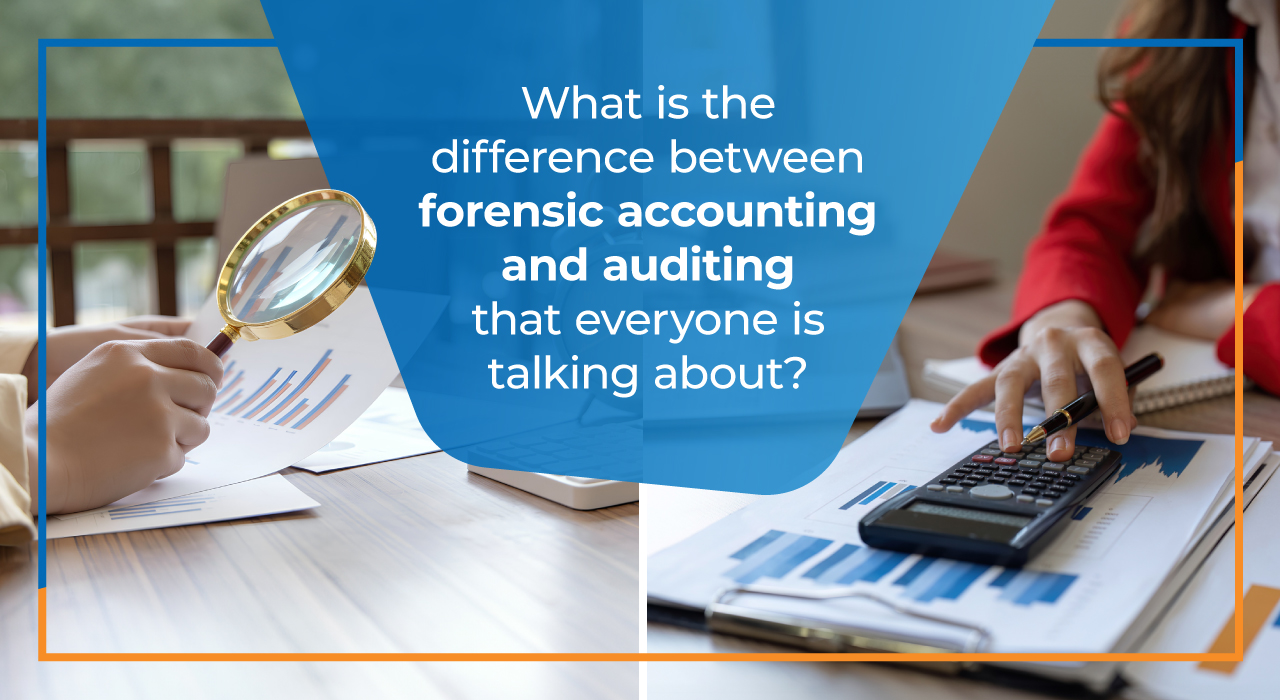An audit, in its most simple definition, is an inspection. An evolved definition of the function is a systematic inspection of financial operations. Every business requires audits to run its systems consistently. But it’s not a one–size–fit–situation. Depending on the size, structure, and objective, the business must conduct various audits. Understanding the nuances between different types of audits is crucial for companies aiming to maintain financial integrity and compliance, providing a sense of reassurance and confidence.
Among the audits, the most critical audits that every business requires are Forensic and internal audits. Forensic and internal audits, despite being financial inspections at their core, have distinct objectives. Each serves unique roles that cater to specific organisational needs. Understanding these roles is key to differentiating between the two types of audits and comprehending their specific purposes.
What is an Internal Audit?
An internal audit is a routine inspection performed within a company to review how well it is operating and to ensure it follows laws and standards. Reviewing and evaluating a company’s operations and internal controls is an ongoing process. The primary aim of an internal audit is to inspect and analyse the effectiveness of an organisation’s risk management, control, and governance processes.
Internal auditors are part of the organisation but maintain an independent stance from the operations they audit. The internal audit covers a wide range of areas, including financial activities, compliance with laws and regulations, and operational efficiency. It identifies potential areas for improvement and assists the organisation in achieving its objectives. Internal auditors report their findings to senior management and the board of directors, providing critical input that helps in strategic decision-making and governance.
Finding our Accounting & Bookkeeping content interesting?
world-class services.
THE FIRST CONSULTATION IS FREE!
What is a Forensic Audit?
Forensic Audit Vs Internal Audit – The differences
Objectives:
Internal audits aim to enhance internal controls and operational efficiency. The sole purpose is to check the financial system consistently to help the company run consistently. Forensic audits focus on identifying and investigating instances of fraud and financial misconduct. Their primary purpose is investigative, aiming to uncover specific fraudulent activities and provide evidence that may be used in legal proceedings.
Scope and Depth of Investigation:
Internal audits are broad and preventive, conducted regularly to ensure that all parts of an organisation align with its goals and are compliant with regulations. In contrast, forensic audits are specific and analytic, triggered by incidents, concerns, or allegations of fraud.
Reporting:
Internal audit reports analyse finance internally to improve processes and inform management about potential risks. However, forensic audit reports often become part of legal proceedings and must be prepared with a high degree of precision and adherence to legal standards.
The Necessary Expertise
An internal auditor requires expertise in financial regulations, auditing standards, and risk management to effectively evaluate an organisation’s processes and controls. They also need strong analytical skills and a thorough understanding of the industry in which they operate to identify areas for improvement and ensure compliance.
A forensic auditor needs specialised knowledge in accounting and legal procedures to investigate fraud and financial misconduct allegations. They must also possess solid investigative skills, attention to detail, and the ability to analyse complex financial data to uncover potential wrongdoing and provide evidence that will stand up in court.
Internal Audit and Forensic Audit: The equal importance
The business and corporate culture in the UAE is complex, with a mix of local companies, multinational corporations, and family-owned businesses. Each type of organisation faces unique challenges and risks, making specific audit practices essential.
Compliance with UAE Regulations:
The UAE enforces rigorous regulations to combat financial crimes such as – money laundering and corporate fraud under Federal Decree-Law No. 20 of 2018 on Anti-Money Laundering and Combating the Financing of Terrorism and Illegal Organisations. Internal and forensic audits play vital roles in ensuring compliance with these laws. Regular internal audits help organisations maintain lawful operations, while forensic auditors investigate financial fraud cases.
Role of Audits in Family-Owned Businesses:
Many UAE businesses are family-owned and operated, presenting unique governance and succession planning challenges. Keeping in mind family values and fostering stakeholder trust, internal audits reinforce legacy. Internal audits assist with succession planning, highlighting gaps in leadership and preparing the business for generational transitions.
Meanwhile, forensic audits play a crucial role in objectively resolving disputes or suspicions of mismanagement. Fraud can be particularly sensitive in family businesses.
Impact on International Business Relations:
For UAE companies engaging in international trade, maintaining a high reputation for compliance is fundamental. Regular internal and forensic audits demonstrate a commitment to ethical business practices, building trust with global partners and investors.
Enhancing Transparency and Stakeholder Confidence:
Both types of audits are crucial for enhancing transparency within organisations. Providing clear insights into company operations and financial practices helps build confidence among investors, stakeholders, and regulatory bodies.
Internal Auditor or Forensic Auditor: Who do you need?
While it’s easier to implement the right audit, in a sensitive and specific situation, you may never know exactly which auditor you require. Internal auditors are critical in ensuring organisations adhere to regulations, manage risks effectively, and operate efficiently. To fulfil these responsibilities, internal auditors and Forensic Auditors need specific skills and qualifications that enable them to conduct thorough and effective audits.
By merging these skills and qualifications, auditors in the UAE can effectively contribute to maintaining your business’s financial integrity. Determining whether your firm in the UAE needs a forensic or internal audit depends on your specific circumstances, objectives, and any potential issues you might be facing. Here’s a guide to help you decide which type of auditor is appropriate for your situation:
When to Call an Internal Auditor
Your internal auditor ensures your company regularly complies with local laws and international standards. Engage them to evaluate your internal controls, processes, and risk management. If you want to improve the efficiency and effectiveness of your operations, engage an internal auditor. They can uncover inefficiencies and recommend practical improvements.
An internal auditor helps proactively manage risks and prevent issues before they arise. They detect potential problems early on so you can address them before they escalate.
Internal auditors provide an independent review of your risk management, governance, and internal controls, enhancing corporate governance by assuring these processes work effectively.
In short, an internal auditor is an employee or an outsourced team that consistently works on your finances and aligns policies with the law.
When to Call a Forensic Auditor
Call a forensic auditor if you suspect fraud, embezzlement, or other financial misconduct. They specialise in investigating and uncovering fraudulent activities when specific fraud indicators arise. If your company faces legal disputes involving financial discrepancies, a forensic auditor provides detailed financial analysis and evidence for litigation purposes.
A forensic auditor must investigate and address irregularities or violations if an external entity or regulator suspects non-compliance.
After detecting a security breach or financial anomaly, a forensic auditor can analyse the incident, measure the impact, and suggest controls to prevent recurrence. A forensic Auditor is necessarily an external team or individual called to investigate financial emergencies involving crime or fraud. You also depend on them to conduct a deeper investigation of Financial Mismanagement.
Audits and You: Key roles to play
1. Assess Risk and Exposure
Regularly assess your company’s risk profile and exposure to fraud or operational inefficiencies. This assessment can help determine the frequency and type of audits required.
2. Monitor Internal Controls
Continuous monitoring of internal controls is essential. Control weaknesses often indicate the need for an internal audit to reassess and strengthen these controls.
3. Listen to Whistleblowers
Pay attention to internal feedback, whistleblower reports, and complaints. These can be early indicators of more profound problems requiring a forensic investigation.
4. Consult with Professionals
Consult with professional audit firms or legal advisors specialising in audit and compliance services when in doubt. They can provide guidance based on the specific nuances of your business and industry.
By understanding these aspects, you can more effectively decide whether your firm in the UAE needs an internal audit for regular review and improvement or a forensic audit for investigating specific, serious issues. Each type of audit serves a different purpose but ultimately contributes to your operations’ overall integrity and efficiency.
Internal and forensic audits are indispensable tools for businesses in the UAE. They ensure compliance, enhance operational efficiency, and safeguard against financial misconduct. At Nair and Nelliyatt CA Firm, our experts are equipped with the skills and knowledge to conduct both types of audits, providing peace of mind and a foundation for financial health in a competitive market. Contact us for your internal auditing and forensic auditing needs.




